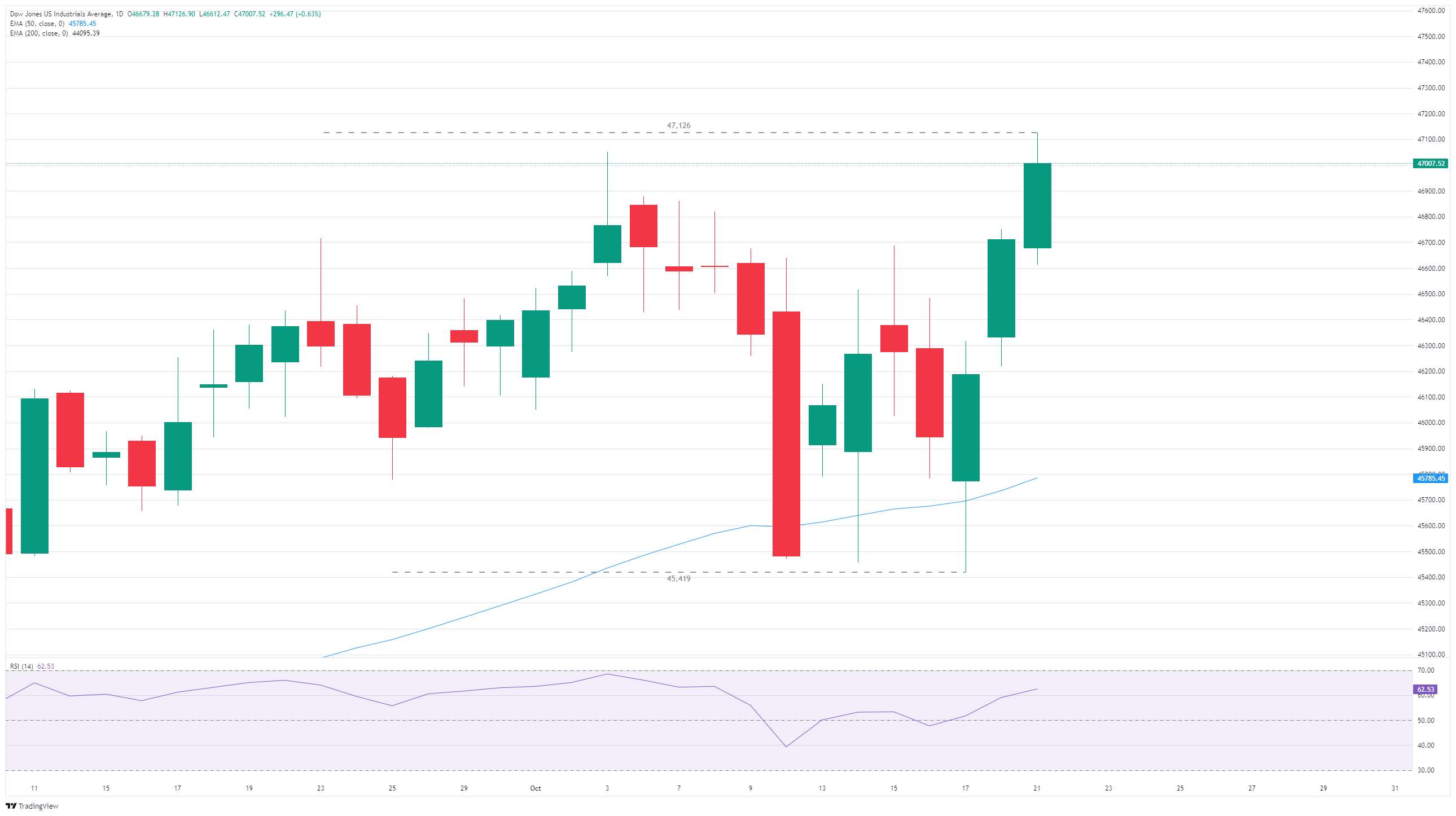Created
: 2025.10.22














![]() 2025.10.22 03:40
2025.10.22 03:40
The Dow Jones Industrial Average (DJIA) surged into a record high on Tuesday, testing above 47,000 and posting a new all-time intraday high of 47,126. 'Old economy' stocks from companies that produce physical goods rather than information or technology services and hardware rallied hard after the latest batch of quarterly earnings swept past market expectations. On the tech side, internet giants waffled on Tuesday after US President Donald Trump suggested his new trade meeting with Chinese President Xi Jinping might not happen.
Coca Cola (KO) and 3M (MMM) surged 3% and 6%, respectively, after posting above-expectations earnings for the third quarter. Zions Bancorp (ZION) also rose 2% after reporting Q3 profits that beat the same period a year ago. Analysts expected a poorer performance from the regional bank after it disclosed a batch of bad loans weighing on its books. General Motors (GM) soared 15% after the automaker announced to shareholders it now expects to offset more of the fallout from the Trump administration's automobile tariffs than previously expected.
The tech sector is awaiting further earnings info from 'Magnificent Seven' companies before dedicating to another leg higher in the ongoing AI-fueled tech rally. The tech sector remains heavily exposed to supply shocks after the Chinese government imposed strict export controls on rare earth minerals that are critical to tech hardware production and upkeep. President Trump lashed out with a threat to impose an additional 155% tariff on China beginning on November 1 if the Chinese government doesn't rethink its trade strategy. Trump waved off an upcoming discussion with China's Jinping, but pivoted to establish a new time and place for fresh trade talks. Now, Trump appears to be second-guessing his own trade talk plans, suggesting that the newly announced trade talks may not happen at all.

The Dow Jones Industrial Average, one of the oldest stock market indices in the world, is compiled of the 30 most traded stocks in the US. The index is price-weighted rather than weighted by capitalization. It is calculated by summing the prices of the constituent stocks and dividing them by a factor, currently 0.152. The index was founded by Charles Dow, who also founded the Wall Street Journal. In later years it has been criticized for not being broadly representative enough because it only tracks 30 conglomerates, unlike broader indices such as the S&P 500.
Many different factors drive the Dow Jones Industrial Average (DJIA). The aggregate performance of the component companies revealed in quarterly company earnings reports is the main one. US and global macroeconomic data also contributes as it impacts on investor sentiment. The level of interest rates, set by the Federal Reserve (Fed), also influences the DJIA as it affects the cost of credit, on which many corporations are heavily reliant. Therefore, inflation can be a major driver as well as other metrics which impact the Fed decisions.
Dow Theory is a method for identifying the primary trend of the stock market developed by Charles Dow. A key step is to compare the direction of the Dow Jones Industrial Average (DJIA) and the Dow Jones Transportation Average (DJTA) and only follow trends where both are moving in the same direction. Volume is a confirmatory criteria. The theory uses elements of peak and trough analysis. Dow's theory posits three trend phases: accumulation, when smart money starts buying or selling; public participation, when the wider public joins in; and distribution, when the smart money exits.
There are a number of ways to trade the DJIA. One is to use ETFs which allow investors to trade the DJIA as a single security, rather than having to buy shares in all 30 constituent companies. A leading example is the SPDR Dow Jones Industrial Average ETF (DIA). DJIA futures contracts enable traders to speculate on the future value of the index and Options provide the right, but not the obligation, to buy or sell the index at a predetermined price in the future. Mutual funds enable investors to buy a share of a diversified portfolio of DJIA stocks thus providing exposure to the overall index.
![]()
Created
: 2025.10.22
![]()
Last updated
: 2025.10.22

FXStreet is a forex information website, delivering market analysis and news articles 24/7.
It features a number of articles contributed by well-known analysts, in addition to the ones by its editorial team.
Founded in 2000 by Francesc Riverola, a Spanish economist, it has grown to become a world-renowned information website.
We hope you find this article useful. Any comments or suggestions will be greatly appreciated.
We are also looking for writers with extensive experience in forex and crypto to join us.
please contact us at [email protected].
Disclaimer:
All information and content provided on this website is provided for informational purposes only and is not intended to solicit any investment. Although all efforts are made in order to ensure that the information is correct, no guarantee is provided for the accuracy of any content on this website. Any decision made shall be the responsibility of the investor and Myforex does not take any responsibility whatsoever regarding the use of any information provided herein.
The content provided on this website belongs to Myforex and, where stated, the relevant licensors. All rights are reserved by Myforex and the relevant licensors, and no content of this website, whether in full or in part, shall be copied or displayed elsewhere without the explicit written permission of the relevant copyright holder. If you wish to use any part of the content provided on this website, please ensure that you contact Myforex.
Myforex uses cookies to improve the convenience and functionality of this website. This website may include cookies not only by us but also by third parties (advertisers, log analysts, etc.) for the purpose of tracking the activities of users. Cookie policy